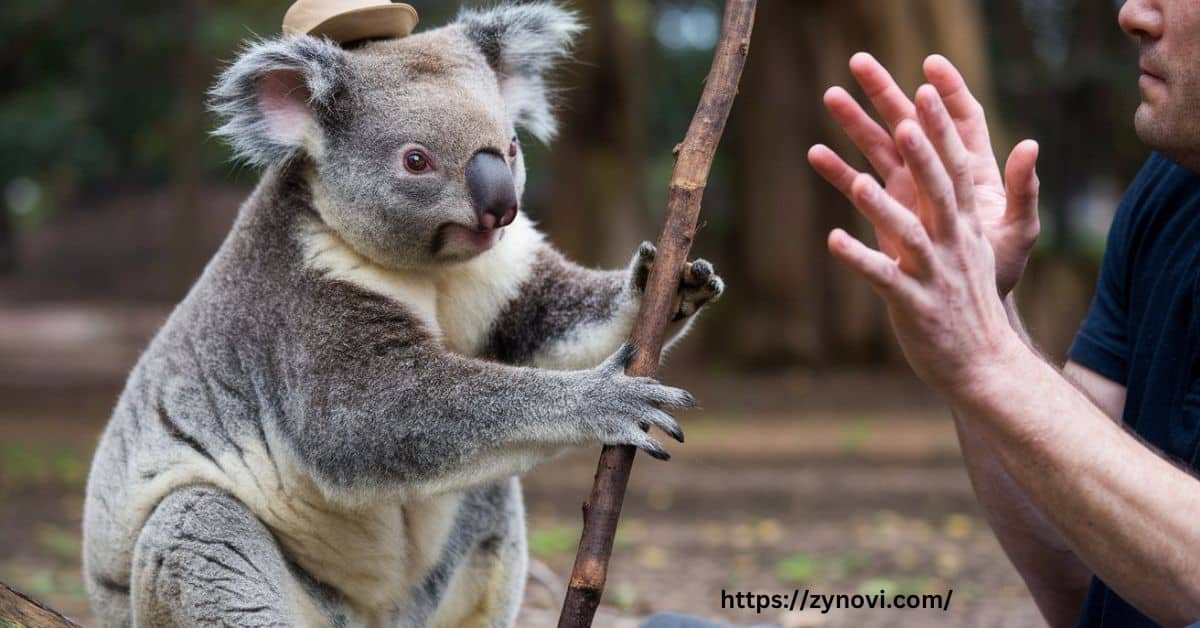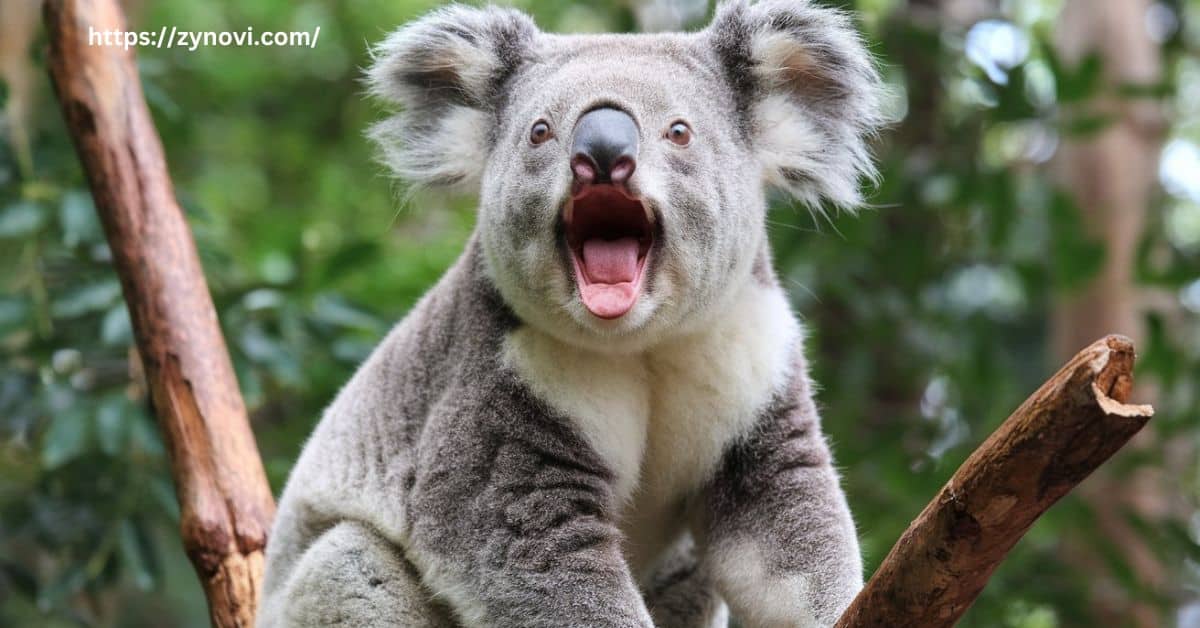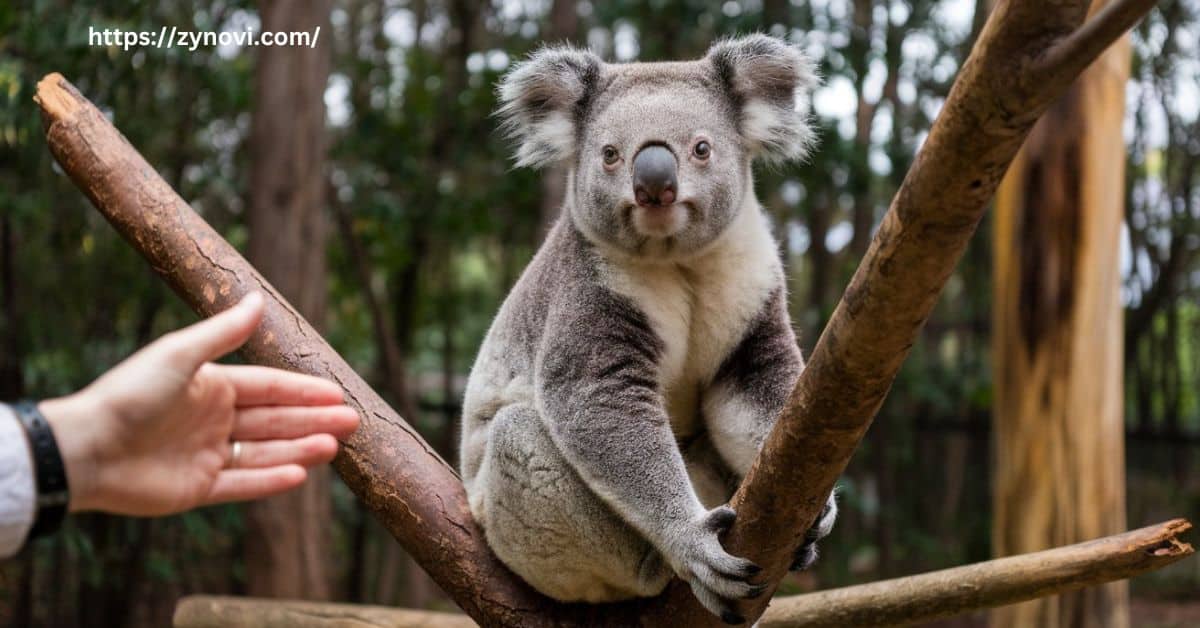Does Koala Attack Humans? Koalas rarely attack humans, but when they feel threatened, cornered, or stressed, they exhibit defensive behaviors.
Are Koalas Dangerous? This question might have crossed your mind if you’ve ever seen these adorable, tree-dwelling creatures. The answer might surprise you!
In this article, we’ll unravel the myths and facts about dangerous koalas and their behavior toward humans. Whether you’re a wildlife enthusiast or simply curious, you’ll discover what truly happens when humans and koalas cross paths and why these marsupials are more complex than they appear. Ready to learn the truth? Let’s find out!
Does Koala Pose an Attack to Humans?
Do Koalas attack humans? Koalas are generally docile animals, known for their low-energy lifestyle and reliance on eucalyptus trees. However, under specific circumstances, they can exhibit defensive behavior that may pose risks to humans. Though rare, incidents involving koala attacks highlight the need for awareness.
- Fact Check: Koalas spend most of their time resting, about 18-22 hours daily. This behavior helps them conserve energy needed to digest their fibrous eucalyptus diet, which is low in nutrients. Their slow-paced lifestyle minimizes movement, further reducing the chances of human encounters in the wild.
- Key Insight: Koalas rarely attack unprovoked. Most incidents arise from humans mishandling or threatening them, such as attempting to pick them up or encroaching on their space. Respecting their boundaries significantly lowers the risk of conflict.
What Are Koalas?
Koalas (Phascolarctos cinereus) are marsupials native to Australia, primarily found in eucalyptus forests and woodlands. They are arboreal, meaning they spend most of their lives in trees.
| Feature | Details |
|---|---|
| Size | 24-33 inches tall, weighing 9-33 pounds depending on location and gender. |
| Diet | Exclusively eucalyptus leaves, consuming about 1-2 pounds daily. |
| Habitat | Eastern and southeastern Australia, including Queensland, New South Wales, Victoria, and South Australia. |
| Unique Traits | Pouch for carrying young (joeys), sharp claws for climbing, and powerful jaws. |
Koalas have evolved to thrive in eucalyptus forests, and their diet heavily depends on these trees, making habitat preservation critical for their survival.
Why Would Koalas Attack Humans?

Do koalas kill humans? While rare, koala attacks on humans typically occur due to specific triggers. Understanding these can help reduce risks.
When Feeling Threatened or Cornered
Koalas, like many wild animals, can perceive humans as potential predators when approached too closely. This sense of threat triggers their natural defensive instincts, leading them to react with behaviors such as hissing, lunging, scratching, or even biting.
These reactions are not acts of aggression but rather survival tactics to deter perceived danger. For example, a koala cornered on the ground with no access to a tree may feel vulnerable and resort to these actions to protect itself. Maintaining a respectful distance minimizes the likelihood of such defensive encounters.
Encounters in the Wild
Unintentional proximity, such as hikers encountering koalas in eucalyptus forests, can lead to defensive behavior.
- Startled Reaction: A koala descending a tree to avoid a perceived threat may feel cornered if humans are nearby, causing defensive postures.
- Fight or Flight: While koalas prefer to escape, a lack of immediate options may provoke hissing or lunging to create space.
Injured or Stressed Koalas
Koalas involved in road accidents or attacked by dogs are more likely to display aggression. Stress and injury amplify their defensive instincts.
- Heightened Defense: Physical pain or disorientation increases their likelihood to lash out when approached.
- Seeking Solitude: Injured koalas often isolate themselves; human interaction disrupts their recovery and raises stress levels.
During Mating Season
From September to March, male koalas exhibit increased territorial behavior and vocalizations. This can make them more aggressive if they feel their territory is invaded.
- Mating-Driven Aggression: Male koalas may interpret human presence as a threat to their dominance.
- Nocturnal Activity: During this period, males are more active at night, making unexpected encounters possible.
How Dangerous Are Koala Attacks?

Does Koala Attack Humans? While koalas’ sharp claws and powerful jaws can cause injuries, attacks are typically minor. However, untreated scratches or bites can lead to bacterial infections.
| Type of Injury | Details |
|---|---|
| Scratches | Caused by sharp claws; can lead to infections if untreated. |
| Bites | Rare but can cause puncture wounds and infections. |
| Other Risks | Potential transmission of zoonotic diseases (e.g., Chlamydia psittaci). |
How to Safely Interact with Koalas
Do koalas bite? Some are safety measure about that when rarely Koala become dangerous:
Tips for Encounters in the Wild
- Keep Your Distance: Stay at least 15-20 feet away. Approaching too closely can make the koala feel threatened, triggering defensive behavior such as hissing or lunging.
- Avoid Sudden Movements: Move slowly and calmly if you spot a koala. Sudden gestures can startle them, increasing the likelihood of a defensive reaction.
- Do Not Feed Wild Koalas: Feeding disrupts their natural diet and can cause health issues. Human food is not suitable for koalas and may lead to long-term dependency or illness.
Guidelines for Wildlife Sanctuaries
- Follow Sanctuary Rules: Always adhere to staff instructions, as they are in place for your safety and the koalas’ well-being. Certain sanctuaries may permit supervised interactions, allowing visitors to learn about these marsupials in a controlled environment. Trust the guidance of trained professionals to ensure the experience remains safe and educational.
- Respect Boundaries: Do not attempt to touch or pick up koalas unless explicitly permitted by staff. Koalas are wild animals, and improper handling can cause them distress or provoke defensive behavior. Allowing koalas their personal space ensures a positive experience for both visitors and the animals.
Do Koalas Carry Diseases That Can Affect Humans?
Koalas are prone to certain diseases, though the risks to humans are minimal with proper precautions.
Common Diseases in Koalas
Chlamydia pecorum: This strain primarily affects koalas’ reproductive and urinary health. Although devastating for koala populations, it is not transmissible to humans, making it a conservation concern rather than a public health issue.
Chlamydia psittaci: Unlike C. pecorum, this strain is zoonotic, meaning it can be transmitted to humans. It can cause psittacosis, a rare respiratory disease. Infection typically occurs through close contact with infected animals, though such cases are exceedingly rare.
Bacterial Infections: Scratches or bites from koalas can introduce bacteria into the wound, leading to infections. Prompt cleaning and antiseptic application significantly reduce these risks, ensuring wounds heal without complications.
Reducing Disease Risks
Wash Hands Thoroughly: After any interaction with koalas, wash your hands with soap and water to remove bacteria or contaminants.
Seek Medical Attention: If scratched or bitten, clean the wound immediately and consult a healthcare provider to ensure proper care and prevention of infection.
First Aid for Koala Bites or Scratches

If you are injured by a koala, immediate care is essential:
- Clean the Wound: Wash the affected area thoroughly with soap and water to remove dirt and bacteria. This step helps reduce the likelihood of infection.
- Apply Antiseptic: Use an antiseptic solution to disinfect the wound, then cover it with a sterile dressing to protect against further contamination.
- Consult a Doctor: If you notice redness, swelling, or other signs of infection, seek professional medical advice promptly. In some cases, antibiotics may be required to ensure proper healing.
Final Verdict: Why Are Koalas truly Dangerous?
Koalas, despite their gentle and docile appearance, are wild animals that must be respected and observed with care. While the risk of a koala attack on humans is extremely low, these marsupials can react defensively if they feel cornered, stressed, or threatened, particularly during mating season or when injured.
By maintaining a respectful distance, avoiding sudden movements, and following sanctuary guidelines, humans and koalas can coexist peacefully.
Additionally, understanding their natural behavior and the importance of habitat conservation further ensures their safety and well-being. With the right precautions, encounters with koalas remain safe, enjoyable, and unforgettable.
FAQs
Are koala attacks common?
No, attacks are rare and usually occur only when koalas feel threatened.
What should I do if I encounter a koala in the wild?
Observe from a distance and avoid approaching or feeding the animal.
Can I safely approach a koala in a wildlife park?
Yes, under supervision in sanctuaries that allow controlled interactions.
How often do koalas transmit diseases to humans?
Transmission is extremely rare with proper hygiene practices.
Is it safe to handle a sick or injured koala?
No, contact local wildlife rescue organizations for assistance.
Conclusion: Does Koala Attack Humans?
While koala-human interactions are generally safe, it is essential to respect these marsupials’ natural instincts and habitat. Avoid direct handling, maintain a safe distance, and follow guidelines in wildlife sanctuaries. Koalas may appear cuddly and approachable, but they are wild animals that rely on their instincts to navigate perceived threats.
By fostering a respectful approach to interactions and understanding their behavior, we can coexist peacefully with these remarkable creatures while ensuring their conservation and well-being. Coexisting with koalas means appreciating their uniqueness and protecting their habitats for future generations.
Koalas may appear cuddly, but remember they are wild animals deserving respect and care.










